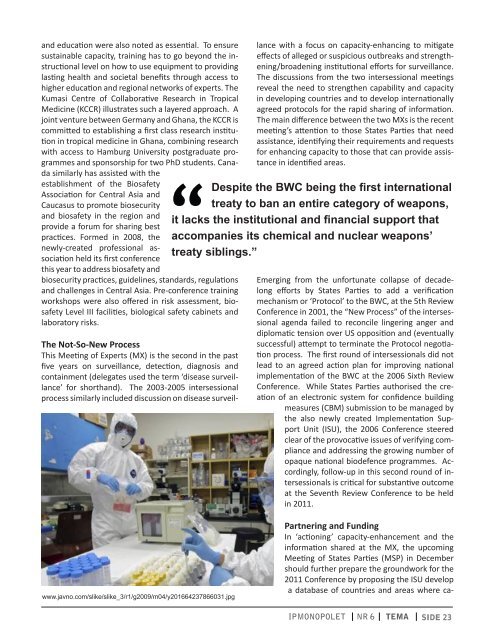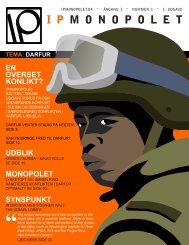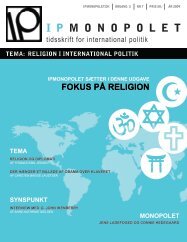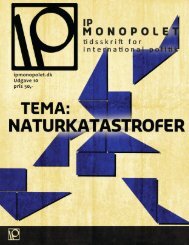fokus på krigens folkeret - IPmonopolet
fokus på krigens folkeret - IPmonopolet
fokus på krigens folkeret - IPmonopolet
You also want an ePaper? Increase the reach of your titles
YUMPU automatically turns print PDFs into web optimized ePapers that Google loves.
and education were also noted as essential. To ensure<br />
sustainable capacity, training has to go beyond the instructional<br />
level on how to use equipment to providing<br />
lasting health and societal benefits through access to<br />
higher education and regional networks of experts. The<br />
Kumasi Centre of Collaborative Research in Tropical<br />
Medicine (KCCR) illustrates such a layered approach. A<br />
joint venture between Germany and Ghana, the KCCR is<br />
committed to establishing a first class research institution<br />
in tropical medicine in Ghana, combining research<br />
with access to Hamburg University postgraduate programmes<br />
and sponsorship for two PhD students. Canada<br />
similarly has assisted with the<br />
establishment of the Biosafety<br />
Association for Central Asia and<br />
Caucasus to promote biosecurity<br />
and biosafety in the region and<br />
provide a forum for sharing best<br />
practices. Formed in 2008, the<br />
newly-created professional association<br />
held its first conference<br />
this year to address biosafety and<br />
biosecurity practices, guidelines, standards, regulations<br />
and challenges in Central Asia. Pre-conference training<br />
workshops were also offered in risk assessment, biosafety<br />
Level III facilities, biological safety cabinets and<br />
laboratory risks.<br />
The Not-So-New Process<br />
This Meeting of Experts (MX) is the second in the past<br />
five years on surveillance, detection, diagnosis and<br />
containment (delegates used the term ‘disease surveillance’<br />
for shorthand). The 2003-2005 intersessional<br />
process similarly included discussion on disease surveil-<br />
www.javno.com/slike/slike_3/r1/g2009/m04/y201664237866031.jpg<br />
lance with a focus on capacity-enhancing to mitigate<br />
effects of alleged or suspicious outbreaks and strengthening/broadening<br />
institutional efforts for surveillance.<br />
The discussions from the two intersessional meetings<br />
reveal the need to strengthen capability and capacity<br />
in developing countries and to develop internationally<br />
agreed protocols for the rapid sharing of information.<br />
The main difference between the two MXs is the recent<br />
meeting’s attention to those States Parties that need<br />
assistance, identifying their requirements and requests<br />
for enhancing capacity to those that can provide assistance<br />
in identified areas.<br />
Despite the BWC being the first international<br />
treaty to ban an entire category of weapons,<br />
it lacks the institutional and financial support that<br />
accompanies its chemical and nuclear weapons’<br />
treaty siblings.”<br />
Emerging from the unfortunate collapse of decadelong<br />
efforts by States Parties to add a verification<br />
mechanism or ‘Protocol’ to the BWC, at the 5th Review<br />
Conference in 2001, the “New Process” of the intersessional<br />
agenda failed to reconcile lingering anger and<br />
diplomatic tension over US opposition and (eventually<br />
successful) attempt to terminate the Protocol negotiation<br />
process. The first round of intersessionals did not<br />
lead to an agreed action plan for improving national<br />
implementation of the BWC at the 2006 Sixth Review<br />
Conference. While States Parties authorised the creation<br />
of an electronic system for confidence building<br />
measures (CBM) submission to be managed by<br />
the also newly created Implementation Support<br />
Unit (ISU), the 2006 Conference steered<br />
clear of the provocative issues of verifying compliance<br />
and addressing the growing number of<br />
opaque national biodefence programmes. Accordingly,<br />
follow-up in this second round of intersessionals<br />
is critical for substantive outcome<br />
at the Seventh Review Conference to be held<br />
in 2011.<br />
Partnering and Funding<br />
In ‘actioning’ capacity-enhancement and the<br />
information shared at the MX, the upcoming<br />
Meeting of States Parties (MSP) in December<br />
should further prepare the groundwork for the<br />
2011 Conference by proposing the ISU develop<br />
a database of countries and areas where ca-<br />
IPMONOPOLET NR 6 TEMA<br />
SIDE 23





